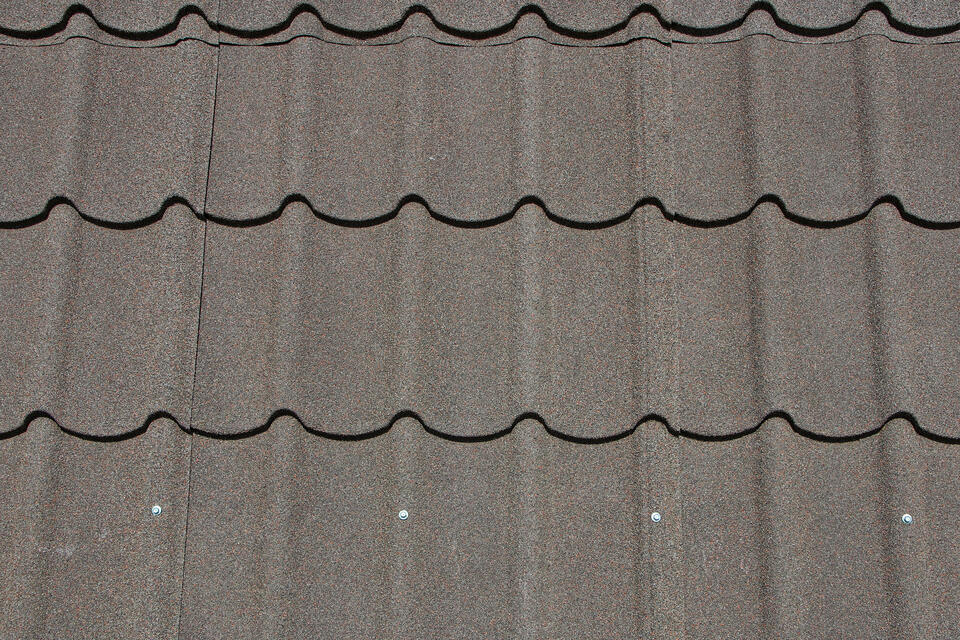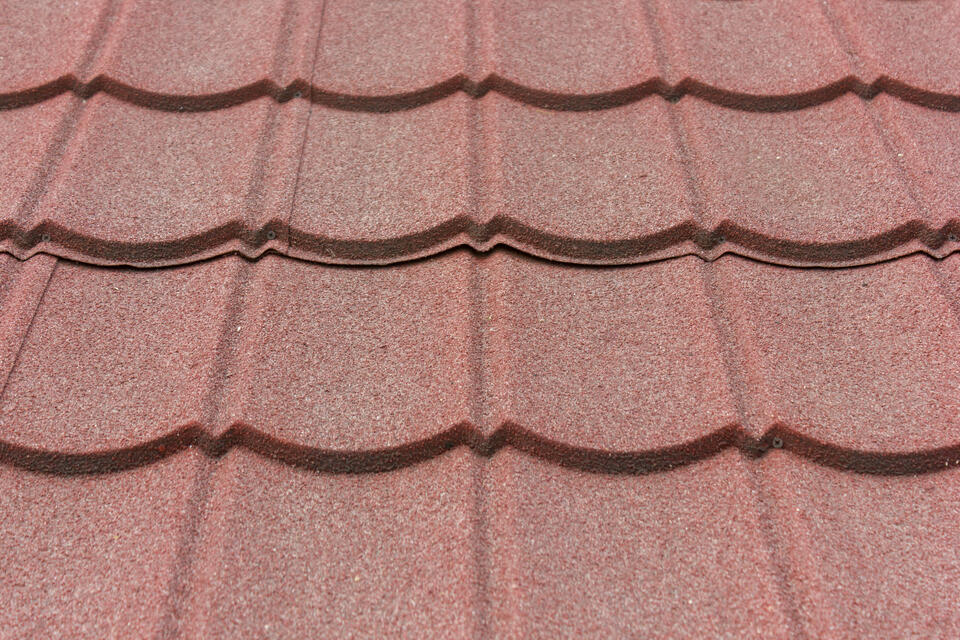Stone Coated Roofing: Everything You Need To Know
When homeowners start contacting residential roof contractors to begin the roof replacement process, they usually lean toward the obvious choices: asphalt or composite shingles, slate, or terra cotta tiles. However, there’s another type of roof that’s less common but is also a good choice for homeowners. Stone-coated steel roofing has many benefits that homeowners may want to consider when trying to decide what type of roofing to use the next time around. This blog article will provide you with in-depth insights into stone-coated roofing, helping you make informed decisions for their roofing projects, including:
- What is stone-coated steel roofing?
- 5 cost comparisons between stone-coated steel roofing vs. traditional roofing options
- Environmental benefits of stone-coated steel roofing
- Maintenance and longevity of stone-coated steel roofs
🤔 What is Stone-Coated Steel Roofing?

Stone-coated steel is one of the many types of metal roofs that roofing contractors in Kansas City, MO, recommend for area homeowners. Stone-coated steel roofing is made from 24- or 36-gauge rolled steel sheets that are treated to resist rusting. These steel sheets are then finished with a thick layer of stone that’s permanently adhered to the surface. This enhances the look of the steel, which can then be molded to look just like asphalt, shake, or tile shingles.
Benefits of Stone-Coated Steel Roofing
Stone-coated steel provides the strength and durability of most other types of metal roofs. They stand up well to high winds, heavy rain, and hail. Steel can handle much more than traditional asphalt roofing, and it lasts a very long time.
- Most metal roofs have a lifespan of between 40 and 70 years, making them a favorite of homeowners across the country.
- Contrary to public opinion, stone-coated steel roofs are not any noisier than other roofs, especially if extra roofing materials such as a solid-sheathed roof deck are added during installation.
- This type of roof weighs less than traditional asphalt and won’t crack, split, curl, or absorb water like traditional shingles.
As if that’s not enough, here’s one more benefit: Stone-coated steel roofing is energy-efficient, reflecting the sun’s heat rather than absorbing it as asphalt roofs do. Any reputable Kansas City roofer should be able to answer your questions and install a stone-coated steel roof.
💵 5 Cost Comparisons Between Stone-Coated Steel Roofing vs. Traditional Roofing Options

When discussing the cost considerations of stone-coated steel roofing, it’s essential to weigh them against traditional roofing options like asphalt shingles or tile roofs. On the surface, stone-coated steel panels tend to have a higher initial cost than asphalt shingles. Homeowners can expect to pay more upfront for materials and installation due to their specialized construction and added complexity in installation. However, this initial investment is often offset by the long-term benefits and cost savings associated with the longevity and durability of stone-coated steel.
1. Initial Cost
Stone-Coated Steel: While the initial investment for stone-coated steel roofing is higher, this cost reflects the durability and longevity of the material. Homeowners can expect to pay more upfront for the installation of stone-coated steel, but this type of roofing system is designed to withstand harsh weather conditions and last for decades.
Asphalt Shingles: The initial cost of asphalt shingles is significantly lower, making them an attractive option for budget-conscious homeowners. This affordability makes asphalt shingles a popular choice, especially for those needing a quick roofing solution or working within tight budget constraints.
2. Lifespan
Stone-Coated Steel: Stone-coated steel roofs boast a lifespan of 40 to 70 years, which greatly exceeds that of traditional alternatives. This extended lifespan means that homeowners may only need to install this type of roof once in their lifetime, offering peace of mind and long-term savings.
Asphalt Shingles: With a lifespan ranging from 15 to 30 years, asphalt shingles may require multiple replacements over the course of homeownership. While the upfront cost is lower, the need for future replacements can add up, increasing the overall cost in the long run.
3. Maintenance
Stone-Coated Steel: One of the key benefits of stone-coated steel is its low maintenance requirements. This roofing material is resistant to common issues such as cracking, curling, and water absorption, leading to fewer repairs over time and less hassle for homeowners.
Asphalt Shingles: Asphalt shingles are more prone to damage from the elements, resulting in more frequent maintenance. Issues like cracking, curling, or water absorption can necessitate regular inspections and repairs, adding to the ongoing costs and effort required to maintain the roof.
4. Energy Efficiency
Stone-Coated Steel: Stone-coated steel roofs are known for their high energy efficiency. They reflect more sunlight than traditional materials, helping to keep homes cooler in the summer and warmer in the winter. This can lead to significant savings on heating and cooling bills over time.
Asphalt Shingles: While generally less energy-efficient than stone-coated steel, asphalt shingles still provide some level of insulation. However, they may not offer the same cost-saving benefits in terms of energy use, potentially leading to higher utility bills.
5. Total Cost of Ownership
Stone-Coated Steel: When considering the total cost of ownership, stone-coated steel roofs tend to be more economical over several decades. The initial investment is offset by the lack of frequent replacements and lower energy costs, making them a cost-effective choice in the long term.
Asphalt Shingles: Although the initial cost is lower, the total cost of ownership for asphalt shingles can become higher due to the need for periodic replacements and potentially increased energy expenses. Homeowners should weigh these long-term factors when deciding on roofing materials.
For homeowners planning to stay in their homes for several decades, the overall cost of ownership may be lower for stone-coated steel than for traditional materials. Therefore, while the upfront cost is an essential factor, it is crucial to consider the total cost of ownership and potential savings over time.
🌱 Environmental Benefits of Stone-Coated Steel Roofing
Choosing stone-coated steel roofing not only brings durability and aesthetic appeal to your home but also offers significant environmental benefits. One of the primary advantages is its recyclability. Unlike traditional asphalt shingles, which often end up in landfills after their useful life, stone-coated steel roofing is fully recyclable. This contributes to reducing solid waste and conserving natural resources. Furthermore, the energy efficiency of stone-coated steel roofs plays a crucial role in minimizing environmental impact. These roofs reflect solar heat more effectively than asphalt, which helps in reducing the energy used for cooling homes. This not only lowers utility bills but also decreases the overall carbon footprint of a household. Additionally, the longevity of stone-coated steel means fewer replacements and less material consumption over time, further adding to its eco-friendly appeal. By opting for stone-coated steel roofing, homeowners can make a sustainable choice that benefits both their wallet and the planet.
🛠️ Maintenance and Longevity of Stone-Coated Steel Roofs

Stone-coated steel roofs are not only durable but also require minimal maintenance, contributing to their prolonged lifespan. Due to their robust construction, these roofs are highly resistant to corrosion, rust, and weather-related damage, ensuring they remain robust even in harsh climates. Routine maintenance primarily involves periodic inspections to check for debris accumulation, such as leaves and branches, which could potentially obstruct drainage and cause water-related issues. Gently cleaning the roof and removing obstructions helps maintain its appearance and functionality.
Moreover, unlike traditional roofing materials that may curl, crack, or warp over time, stone-coated steel roofing maintains its structural integrity. This reduces the need for frequent repairs, further extending its effective lifespan that ranges between 40 to 70 years, and sometimes even longer with proper care. To ensure maximum longevity and performance, it’s advisable to enlist professional roofing services for regular inspections and cleaning. With their ability to withstand extreme weather conditions while requiring minimal upkeep, stone-coated steel roofs offer a hassle-free roofing solution for homeowners looking for longevity and reliability.
🙌 Durability, Efficiency, and Savings with Shamrock Roofing and Construction
Stone-coated steel roofing stands out as a superior choice for homeowners seeking durability, energy efficiency, and environmental sustainability. With its robust construction, aesthetic versatility, and minimal maintenance requirements, this roofing option not only enhances the value and appeal of a home but also offers long-term financial savings. If you’re considering a new roof, give us a call first at Shamrock Roofing and Construction. We’re one of Kansas City’s premier residential roof contractors, and we’d love to earn your business. We specialize in all types of residential roofing, as well as roof repair and maintenance. We also do emergency roof repairs! If you have questions about the types of roofs available, contact us today. We’ll be happy to answer all your questions and help you choose the roof that’s right for you!
